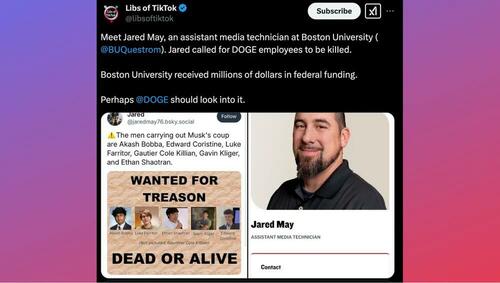
Сотрудник Бостонского университета, призвавший к смерти команду DOGE, находится под следствием
Эмили Стердж о реформе кампуса
Сотрудник Бостонского университета, который якобы угрожал сотрудникам Департамента эффективности правительства (DOGE) в сообщении в социальных сетях, как сообщается, находится под федеральным расследованием за возможные нарушения федерального закона.
Реформа кампуса Недавно сообщалось, что Джаред Мэй, который работает помощником специалиста по средствам массовой информации в Бостонском университете, поделился постом в Интернете, в котором шестеро молодых членов DOGE идентифицировали себя с подписью "Wanted for Treason, Dead or Alive. "
«Мы не потерпим угроз в отношении работников DOGE или нарушения закона недовольными», — заявил временный прокурор округа Колумбия Эдвард Р. Мартин-младший.

Согласно федеральному закону, угроза правительственным чиновникам является уголовным преступлением.
18 U.S.C. 111 заявляет, что любой, кто «насильственно нападает, сопротивляется, выступает против, препятствует, запугивает или вмешивается» федеральный служащий может быть оштрафован или подвергнут тюремному заключению.
Мартин публично заявил: «Наш первоначальный обзор представленных нам доказательств указывает на то, что определенные лица и/или группы совершили действия, которые, как представляется, нарушают закон в отношении сотрудников DOGE. "
«Мы находимся в контакте с ФБР и другими партнерами по правоохранительным органам, чтобы действовать быстро. Мы также готовим наших прокуроров, - сказал Мартин.
Прокурор округа Массачусетс Лиа Б. Фоли также подтвердила, что ее офис расследует этот вопрос, сообщает Boston Globe.
«Мы серьезно относимся к этим угрозам», — заявил Фоли.
«Мы будем предпринимать любые юридические действия против любого, кто препятствует вашей работе или угрожает вашим людям... Мы будем защищать DOGE и других работников, несмотря ни на что, — написал Мартин в письме Илону Маску.
Реформа кампуса Поговорил с Кеном Ташджи, который более 21 года занимал должность генерального юрисконсульта Массачусетского колледжа и в настоящее время является адвокатом и консультантом по высшему образованию.
«Независимо от того, нарушает ли пост Мэй федеральный закон или считается защищенной речью в соответствии с Первой поправкой, зависит от множества факторов, в том числе от того, была ли угроза конкретной и заслуживающей доверия, намеревалась ли Мэй причинить страх или вред сотрудникам DOGE, и была ли угроза связана с официальными обязанностями сотрудников как федеральных работников», - сказал Ташжи.
Ташжи, бывший Реформа кампуса Сотрудник по высшему образованию, сослался на следующие возможные нарушения:
- Межгосударственные коммуникации угроз (18 U.S.C. § 875) – Запрещается посылать угрозы причинить вред другому лицу посредством электронной связи;
- Возмездие федеральному чиновнику (18 USC § 1513) – запрещает возмездие федеральным служащим за действия, предпринятые в ходе их официальных обязанностей; или
- Поощрение или подстрекательство к насилию (18 U.S.C. § 373) – Запрещает угрозы, явно поощряющие или побуждающие других к совершению насильственных действий против федеральных служащих.
Пост Мэй в социальных сетях может также нарушать политику Бостонского университета, что может подвергнуть его дисциплине или увольнению.
В разделе Справочник для сотрудников университета под названием «Профессиональные стандарты поведения» рассматривается «насильственное поведение в любой форме, включая угрозы» как «неприемлемое поведение сотрудников, которое имеет прямое отношение к рабочей среде и общим интересам университета». "
Кодекс также запрещает «незаконное поведение, происходящее за пределами рабочего места, которое влияет на пригодность работника для работы в университете» и «любые действия, которые поставят интересы сотрудника в конфликт с интересами Бостонского университета». "
По словам Таши, пост Мэй в социальных сетях "может представлять угрозу насилия в нарушение правил поведения БУ. "
«Его должность также не соответствует этическим стандартам честности и добросовестности БУ, ставит его интересы в противоречие с интересами Университета и поднимает серьезные вопросы о его пригодности для продолжения работы. Кроме того, основываясь на обширном освещении в средствах массовой информации, его действия плохо отразились на университете.
«В сложившихся обстоятельствах существуют достаточные основания для дисциплины господина Мэй, вплоть до его увольнения», — сказал он.
В заявлении от имени Бостонского университета представитель сказал: «Нам известно о сообщении, сделанном сотрудником в его личном аккаунте в социальных сетях... Мы не комментируем кадровые вопросы. Выраженные взгляды не отражают ценности Questrom School of Business, сообщает Boston.com.
Ташжи пояснил, что, поскольку Бостонский университет является «частным высшим учебным заведением, защита свободы слова Первой поправки не распространяется на Бостонский университет, и он обладает большей гибкостью для дисциплинирования речи, которая в противном случае могла бы быть защищена в государственном учреждении. "
«BU может дисциплинировать Мэй за его онлайн-выступление в соответствии с его собственной политикой», — заключил он.
На фоне негативной реакции в социальных сетях и со стороны федеральных прокуроров была удалена веб-страница сотрудников Мэй на веб-сайте университета.
Тайлер Дерден
Thu, 02/20/2025 - 14:45











![Sąd pokazał jak obliczyć zachowek od mieszkania 191 500 zł. Dla córki, syna, wnuka. Obliczenia. Zasady. Wzory [Przykład]](https://g.infor.pl/p/_files/38265000/podwyzki-38264590.jpg)


